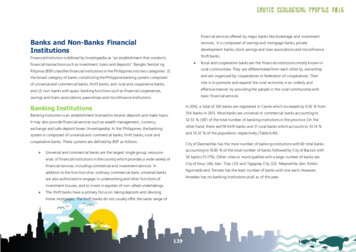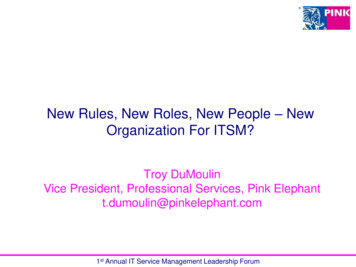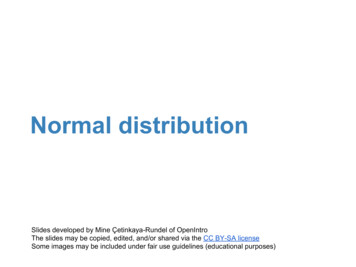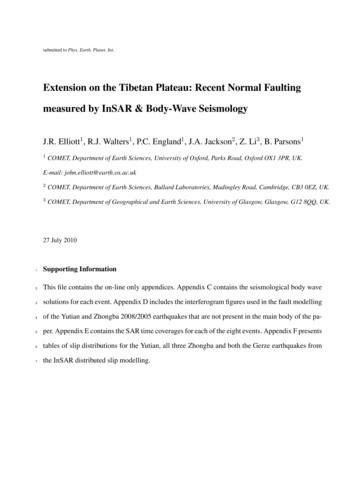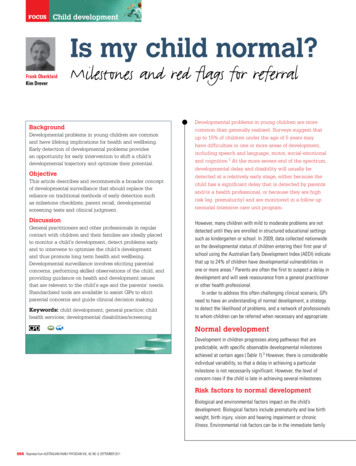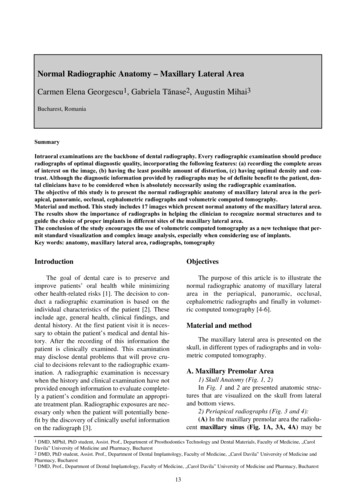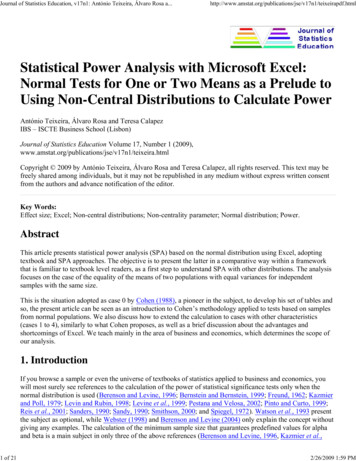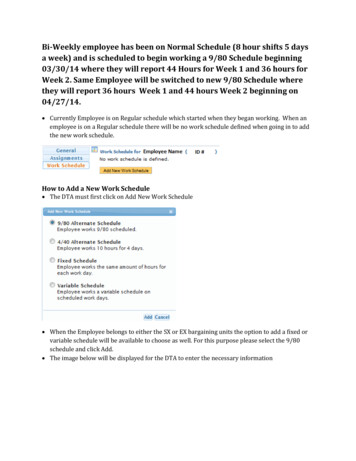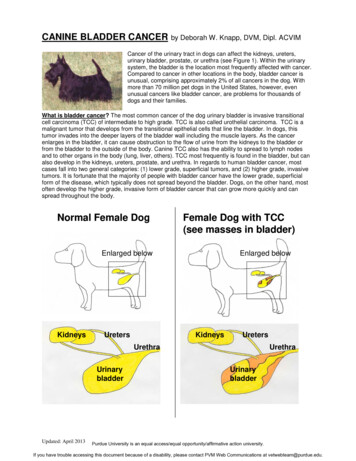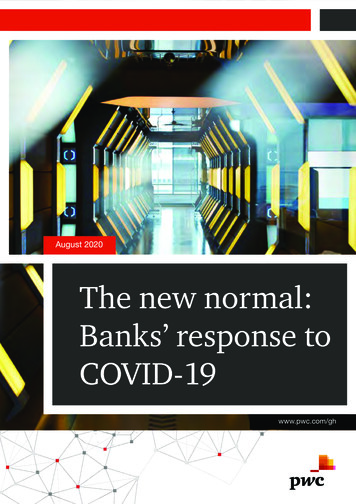
Transcription
August 2020The new normal:Banks’ response toCOVID-19www.pwc.com/gh
2PwC Ghana Banking Survey 2020
Table of contentsCSP’s message4Message from GAB8Tax Leader’s message101Economy of Ghana132Survey Analysis173Banking Industry Overview524Total Operating Assets565Market Share Analysis606Profitability and Efficiency707Return on Shareholders' Funds768Liquidity829Asset Quality91Appendices953PwC Ghana Banking Survey 2020
CSP’s MessageCSP’s MessageBackgroundThere is no doubt that the COVID-19 pandemic has somewhattransformed the world’s way of life.Vish AshiagborCountry Senior PartnerIn many ways, the world’s future – as previouslyenvisaged or forecasted, which most analystsexpected to manifest in 2025, 2030, and in somecases 2050 – has become (or is fast becoming)our present; what many are calling the “newnormal”.The novel Coronavirus has impacted every facetof our lives; healthcare, education, trade andcommerce, hospitality, banking and financialservices, government services etc.In most cases, the world had not fully passed thefuture-proof readiness test at first instance. In itsrecovery and seeking to return life to normalcy,the world has reduced physical contact amonghumans and retreated into a virtual world. Now,more than ever in the world’s history, thereis almost no process or service that can becompletely executed without leveraging a digitalplatform, and banking is no different.An overview of the industry at the height of the COVID-19 pandemicIn Ghana, at the early stages of the pandemic in March 2020, the government outlined measuresto restrict movement and reduce non-essential physical contact between persons. The aimwas to accelerate a “flattening of the curve”, delay and lower the peak of the case incidences.The “stay at home” and physical distancing directives, as well as the lockdown are all specificexamples of these measures.Bank of Ghana (BoG) issued its own instructions to banks to take steps to reduce the risk thatthey pose as vectors for the spread of COVID-19. The regulator asked banks to ensure thatbank-owned and bank-operated interfaces that customers interact with physically (e.g. bankinghalls, ATMs, money counting machines, etc.) are sanitised frequently. Additionally, concernedabout the potential setback to the economy, the regulator implemented measures meant toenhance banks’ ability to respond to the needs of their clients and to support the economyin general. These measures involved cuts to the Monetary Policy Rate (by 150 basis points)from 16% to 14.5% and the Primary Reserve Requirement (by 200 basis points) from 10% to8%. The market took a cue and, by the end of June, interest rates for interbank, governmentsecurities, and bank lending had all fallen by various degrees. Still, it is reported that creditadvanced by banks to both the private and public sector had fallen by the end of July 2020 –both demand for and supply of loans had dropped in the face of the pandemic-driven economicuncertainty.4PwC Ghana Banking Survey 2020
CSP’s MessageIn response to the regulator’s directives, andalso driven by their own sense of survival andgrowth, banks operating in Ghana activatedtheir respective business continuity plans. Theseplans sought to ensure that banks continueto provide services to their customers whilekeeping their staff safe. Among others, banks’opening hours were varied and customer trafficin banking halls was controlled. But, invariablyand to varying degrees, banks migrated aspectsof service delivery to online or digital platforms.Focus of our 2020 banking surveyThough “digital” had already gained heightenedattention as a critical component of businessand operating models in many industries,banking included, banks in Ghana needed tospeedily ramp up the role of digital in their dailyinteractions with customers to be compliant andcompetitive.Naturally, we are curious to learn how banksfared with this speedy “digital migration”, aswe believe there are lessons to be learnt for thebenefit of many stakeholders in the industry. Wealso seek to explore the reviews banks in Ghanaare considering to their operating models in apost-pandemic era.Consequently, PwC’s banking survey this yearseeks an answer to the question “How do banksin Ghana intend to operate after COVID-19?”.We asked banks to share their experiencesand plans across different areas, includingregulations, industry play or competition, the roleor function of the head office, technology andcyber security. We also asked banks questionsrelating to delivery channels and businesscontinuity. The findings from the survey makevery interesting reading.Highlights of our key survey findingsFeedback from the survey is not suggestiveof a total transformation of Ghana’s bankingsector. For instance, it is not likely thatobservers would see a bank in the immediateyears that follow recovery from the pandemicand wonder “is that really a bank?”. Still, fromthe responses given by bank executives, thereare indications of remarkable progress alongthe digital journey. For now, it seems that focusis on service delivery channels and backoffice systems with an emphasis on creating– especially for the latter – an environment thatsupports remote working by staff.We expect that details of how this progressis achieved will evolve with time, as differentbanks select different tracks in their pursuitto become “a digital bank”. A few banks thatparticipated in the survey suggest that theirevolution into a digital bank will be organic –that they will acquire the relevant infrastructureand equipment, recruit qualified IT personneland train their current teams.The majority of banks represented in thesurvey (62%) favour collaborations withFintech companies as a way of leapfroggingup the digital ladder. They hold the view thatpartnerships with Fintechs would propelthe banking industry more quickly to thestate where digitised service delivery iscommonplace across the industry.In the case of service delivery channels, banksexpect to migrate more of their customerinteractions that currently occur at their brickand mortar addresses to mobile platforms.Indeed, this would not be a novel practicein the industry, as a good number of banksoperating in Ghana already have robust digitalchannels that enable their customers toconduct a range of banking transactions ona 24/7 basis. Still, there are some banks thathave not sufficiently leveraged the power ofdigital as part of their business model.55PwC Ghana Banking Survey 2020
CSP’s MessageAlong with plans to deepen the role of digital inchannels, banks have also signalled intentionsto innovate around product and service deliveryusing digital tools. Of especial importance forbanks is how to mobilise customer depositsdigitally. Deposit mobilisation is one areathat caused banks worry at the height ofthe movement restrictions; 69% of surveyrespondents reported that they are alreadyexploring digital solutions for – among others– cheque and cash deposits. The pandemichas underscored the declining role of brick andmortar in banking. For instance, 69% of surveyrespondents noted that customers reduced theirin-person patronage of bank services, while anequal percentage reported increased traffic ontheir digital and electronic touchpoints. In somecases, banks reported 200% growth in trafficvolumes on their digital channels.Away from customer-facing systems,banks have expressed their willingness toincorporate remote working into their workpractices. In response to the government’sand regulator’s directives on ensuring a safeworking environment for their staff, most banksimplemented a shift/ rotational system. Lessthan the full complement of staff at head officeand branches were required to physically reportto their regular places of work on any givenday, and for shorter periods too. Though thiswas rather unusual for most banks, feedbackmust have been good, as a majority of surveyrespondents (69%) indicated that their banks6PwC Ghana Banking Survey 2020intend to maintain remote working as an optionavailable to staff based on their job descriptions.To be able to achieve the above describedtargets in the digital bank agenda, banks mustinvest in technology, partnerships and training.Survey respondents noted that some banks havealready made (or plan) investments to expandcapacity in technology infrastructure to ensurethat service is not disrupted in a manner thatcreates a poor experience for their customers.Similar investments in technology have beenmade (or are planned) to ensure that staff canwork effectively away from their offices.Along with remote working, banks expectto increase the role of bots in the servicedelivery value chain. Some banks expectthis digital progression to result in reducedstaffing. Employees that remain are expectedto acquire new skills that make them awareof, and therefore able to reduce exposure tothe increased cybersecurity risks that remoteworking and digital service delivery presentbanks with.Finally, some banks have expressed morewillingness now to explore various formsof partnerships with Fintech companies,acknowledging that they potentially stand to gainmore rather than lose by collaborating ratherthan competing.
CSP’s MessageConclusionAs a key stakeholder of the Ghana bankingindustry, we have been closely observing howthe industry has responded to the COVID-19pandemic. We are prompted to reflect on thetheme of our 2015 Ghana Banking Survey;Bank of the Future: what customers want toexperience by 2020. In that survey, almost1,000 bank customers shared their service andexperience priorities around banks’ services.They also communicated their views of banks’readiness to deliver on those experiencepriorities. At that time, there were significantgaps in banks’ readiness and ability to meetthese customer expectations.Indeed, if the industry had taken a cue from thepublished findings of that survey – some banksdid! – banks would have been better preparedfor the COVID-19 pandemic. There would havebeen fewer challenges engaging with customersvia digital platforms. Indeed, most banks wouldhave been concluding execution of their firstmedium-to-long term digital strategic plans, oron the threshold of refreshing them.Without doubt, the pandemic has taught theindustry some useful lessons. It is our hopethat banks, in implementing the changes thatthey refer to in their survey responses, will workwith credible partners that will make the journeyless painful for them and for their stakeholders,including their shareholders whose value atrisk they must protect. Our Financial ServicesIndustry Group has experienced resources thatcan engage with you and guide you on thisjourney. Talk to us.Happy reading Stay safe!7PwC Ghana Banking Survey 2020
Message from GhanaAssociation of BankersJohn AwuahDeputy Chief Executive OfficerGhana Association of BankersAvailable records point to a banking industry thathad, until the advent of the global Coronaviruspandemic, responded positively to the sectorreforms undertaken by the industry regulator,the Bank of Ghana. The sector reforms createda more robust financial service industrycharacterised by better corporate governance,adequate capital levels, improved complianceand ethical regimes and sound risk managementpractices. The strongly capitalised banks thatsurvived the reforms continue to increaseinvestments in Information Technology (IT) tomaximise efficiencies while meeting the everchanging demands of sophisticated customers.The emergence of COVID-19 has shaken theworld economy and banks and their customersare no exception. It became very clear rightfrom the onset that not only is the COVID-19pandemic a health crisis but an economiccrisis as well. The importance of banks andother financial intermediary entities cannotbe overemphasised in fighting this pandemicby contributing to restoring and getting theeconomy back on track.in the most affected sectors adjusting theiroperations and hence their dealings with bankson the back of the pandemic.The challenges faced by customers haveresulted in both direct and indirect impactson banks. Banks with high exposures tosignificantly affected sectors such as aviation,tourism, transport, education and religion haveexperienced direct impact of the pandemic inthe form of depressed cash flows resulting inlower repayment inflows on existing exposuresand pressure to restructure and in some cases,calls for further drawdowns to salvage whatthese customers could to assist them navigatethrough the pandemic. The COVID-19 drivendisruptions suffered in the value chain ofbusinesses has also impacted banks indirectlyas the general economic environment tooka downturn with many customers especially8PwC Ghana Banking Survey 2020The timing of the Coronavirus AlleviationProgramme (CAP) announced and beingimplemented by the Government of Ghana andother interventions introduced by Bank of Ghanacoupled with the response from the banks, allof which are aimed at cushioning businesses(including banks and their customers) againstthe economic and social impact of the pandemiccould not have been any more appropriate andhandier. The banks contributed in various waysto support customers and the general publicnot only by implementing the guidelines andinterventions announced by the regulator butalso setting up a COVID-19 relief fund of GHS10 million established by the Ghana Associationof Bankers (GAB) with equal contributions fromthe banks. Banks also made direct and verygenerous donations to fight the pandemic andprovide relief items to the needy and relevantinstitutions at the forefront of the fight againstthe pandemic. Part of the funds raised by GABhas been utilised to contribute towards theconstruction of the 100-bed infectious disease
Message from Ghana Association of Bankerstreatment and isolation centre, to donate to theessential frontline workers and also to give tothe vulnerable in society through the provision ofpersonal protective equipment, food and otherrelief items.At a more customer-focused level, banks have,following the re-assessment of existing financialexposures, on a case by case basis and uponrequest from identified obligors, restructured therelated exposures in line with new realities oncustomers’ cash flows resulting from businessdisruptions introduced by the pandemic. Thishas resulted in various forms of restructuringwhich has led to the introduction of repaymentmoratoria, facility extensions, re-profiling ofrepayments amongst other mechanisms. Theyhave also positively responded to the measuresannounced by the industry regulator andaccordingly reduced interest rates and grantednew loans even during the pendency of theepidemic. A total of over GHS 3 billion whichshould have been received by banks as loanrepayments between March and June 2020 wasnot received as a result of the restructuring andreprofiling of loans to customers for instance.Similarly, in the same period, a total of GHS 3.6billion new loans were approved and disbursedto customers with GHS 1.1 billion drawdownsallowed on existing legacy committed lines andGHS 2 billion of new lines committed and madeavailable during this uncertain period.The banking industry has kept faith withthe regulator and the central government inensuring the economy at large sails throughthis pandemic with minimal negative impact.We continue to engage our stakeholders formore guidelines and clarity on some of thealready announced initiatives so that the desiredoutcomes are achieved, and the economybrought back on track. One such key discussionis around financial reporting of the bankingindustry amidst COVID-19 with focus onassessment for impairment on these financialexposures in the books of the banks givenongoing reliefs and initiatives while complyingwith the requirements of International FinancialReporting Standards (IFRS) 9. To this end,we call for dialogue among the auditors, theirregulators and standard setters, the banks andBank of Ghana to ensure some standardisationon how the impact of COVID-19 is factored inthe impairment assessment of the industry whilestill having regards to the specific character ofthe loan portfolios of each bank.Also, the implementation of the CapitalRequirements Directive (CRD) beyond theintroduction of the new required nominalminimal capital is key to ensuring the risksfaced by banks are appropriately reflectedin their books including COVID-19 with theright capital charges to influence how bankingis done going forward and to preserve thecapital of the banking industry. We call on thegovernment to introduce policy initiatives andincentives to banks to redirect the trajectory ofcredit expansion in the post COVID-19 era andurge businesses and households to take fulladvantage of any ancillary opportunities createdby the pandemic.There is no doubt COVID-19 has affectedthe Ghanaian banking landscape. The initialinvestments made by banks in technology hasenabled the industry to support customersduring these uncertain times. The benefits of the‘new normal’ will surely continue to change theway banking business is done going forward andGAB is once again happy to work with PwC andshare with you what those in the boardroomsof banks are thinking regarding COVID-19. Thisreport reveals key insights on banks’ responseto the COVID-19 crisis and provides a glimpse ofwhat to expect on the future of banking in Ghanagiven COVID-19.Enjoy reading!99PwC Ghana Banking Survey 2020
Tax Leader’s MessageGeorge KwatiaTax Leader, PwC GhanaCOVID-19 has changed the dynamics of business in the worldand the banking sector is no exception. The actual impact ofCOVID-19 in 2020 will be measured in 2021 when the 2020financial performance of banks becomes available. Here are a fewobservations from a tax perspective.Tax performance of banks in 2019Overall, the banking industry remitted 28.98%of their profit before tax to the Governmentof Ghana as Corporate Income Tax (CIT) andNational Fiscal Stabilisation Levy (NFSL). Thisis a significant improvement compared to thepay-out (also known as Effective Tax Rate orETR) of 32.27% and 32.32% in 2018 and 2017respectively. The ETR is the ratio of incometaxes over profit before taxes.Interestingly, the banking sector’s ETR (i.e., CITand NFSL over profit before tax) in 2019 is forthe first time, in the past three years, below the30% blended rate of CIT (25%) and NFSL (5%).In fact, more than 50% of profitable banks hadan ETR below 30.3% with an interquartile rangeof 27.7% to 31.8%.As NFSL only depends on the accounting profit(i.e., profit before income tax), the key variablethat resulted in the reduction of the ETR belowthe blended rate of 30% is the profit that issubject to CIT (known as taxable/ chargeableincome). The industry continues to enjoy taxreliefs of 5% on income from transactions withthe agriculture sector. The banking industry’sinvestment in the agriculture sector witnessed a95% growth in 2019 on the back of the Plantingfor Food and Jobs Initiative. Some banks alsoenjoyed deductions from previous years forwhich they did not recognise deferred tax assetsand capitalisation of expenses for tax purposes.These factors among other things account forthe drop in industry ETR.The tax impact of COVID-1910PwC Ghana Banking Survey 2020Some of the key changes to business activitiesare likely to continue after the COVID-19pandemic. We are convinced that the newapproach to doing business will impact taxationof banks in Ghana. We make the followingobservations about the likely impact of bankingbusiness changes to taxation of banks:
Tax Leader’s Messagei. Expected increased in digitisation ofbusiness operationsThe pandemic has forced the banking industryto identify additional ways of speeding up thedigitisation of their operations. The lockdown,voluntary closure of some brick-and-mortarbranches and suspension of Saturday bankingservices have compelled customers who oncerarely patronised online banking services toadopt digital banking applicati
As a key stakeholder of the Ghana banking . industry, we have been closely observing how the industry has responded to the COVID-19 pandemic. We are prompted to reflect on the theme of our 2015 Ghana Banking Survey; Bank of the Future: what customers want to experience by 2020. In that sur
